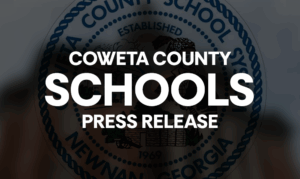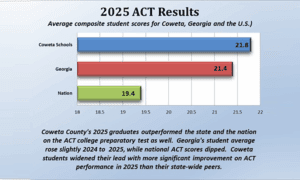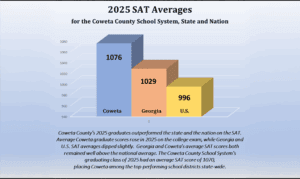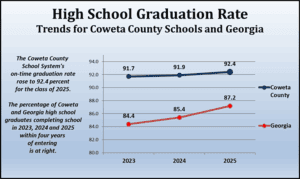The lawsuit by the Coweta County School System over the establishment of the Coweta Charter Academy at Senoia did not stop representatives of school operator Charter Schools USA with meeting with more than 120 family members April 19 at the A&O Bridges Recreation Center in Sharpsburg.
Florida-based Charter Schools state Coordinator of Operations Sandy Castro, Miami school Principal Sylvia Hall and charter academy board member and Coweta County businessman Ernest Taylor laid out the specifics of the school, its curriculum and requirements and fielded questions ranging from homework assignments to teacher accountability to parental involvement.
The school is currently accepting applications during the open enrollment period that will end later this month. The K-8 school is expected to serve approximately 800 students. As of April 17 more than 750 applications had been received, Castro said.
Though the lawsuit presents a barrier in terms of some financing issues related to the construction of the school on Rockaway Road, Charter Schools USA Vice President of Operations Richard Page said he remains optimistic about the lawsuit’s eventual outcome and committed to the plans to have the K-8 school open for business in August.
“Our plan to build the school is being impacted by the lawsuit. Nonetheless, we’re committed to making this happen,” Page said, noting that the school in its initial operation may or may not be located on the Senoia property. “We’re not worried about losing the charter.”
That was the message brought Monday night by Castro, who told the packed house in Sharpsburg that, “The plan is that we’re going to give people a school in August.”
The lawsuit is expected to have an initial hearing May 7 in Fulton County Superior Court. Regardless the outcome, it would not be unexpected for either side to appeal the decision. As it currently stands, the operation of charter schools in Georgia has already been approved by the General Assembly and signed into state law.
The Senoia Planning Commission earlier this month unanimously approved the conceptual site plan for the 60,000 square-foot school and gym situated on 18.6 acres on Rockaway Road on Senoia’s north side.
The Coweta County School System has joined the ranks of a handful of other systems around the state by filing a lawsuit April 2 in Fulton County Superior Court against the Georgia Charter School Commission (GCSC) and the Georgia Dept. of Education (DOE) on the grounds that current state law allowing charter schools in unconstitutional. The suit follows the Georgia Charter Schools Commission’s (GCSC) February approval of the Coweta Charter Academy at Senoia.
Among its many claims, the suit asserts that the state law that formed GCSC is unconstitutional because it allows GCSC to operate as an independent school system, grants GCSC the authority to create and control charter schools as opposed to the local boards of education by people who are not residents of the county and creates “special schools” though charter schools are not “special.”
Meantime, Georgia Charter Schools Association (GCSA) CEO Tony Roberts in a recent op-ed letter weighed in on litigation issues from the charter school perspective.
“While we are in the middle of one of the most difficult economic periods in our state’s history, these school districts have chosen to use public tax dollars,” Roberts said on the GCSA website. “(The) dollars that could and should be devoted to teacher salaries and instructional programming — to sue a public school. This clearly, and sadly, illustrates the districts’ true intentions. Unfortunately, their chief interest appears to be maintaining control over money and power, and continuing to monopolize our public education system, to the detriment of our students.”
The Georgia Charter Schools Act of 1998 states that a charter school shall be included in the allotment of funds to the local school system in which the charter school is located. The local board and state board will treat the charter school no less favorably than other local schools in the school district with respect to the provision of funds for instructional and school administration and, where feasible, transportation, food services, and building programs. The amount of money the charter school will receive from the local board will be determined according to the provisions of the Charter Schools Act of 1998, according to DOE.












Leave a Comment
You must be logged in to post a comment.